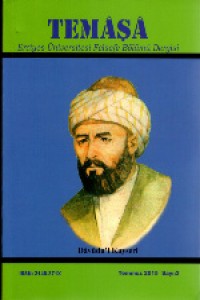Öz
Selçuklular döneminde yetişip, Osmanlı’nın ilk müderrisi olan ve Osmanlı düşünce geleneğinin oluşmasına büyük katkı sağlayan Dâvûdü’l-Kayserî, tasavvuf felsefesi alanındaki çalışmaları ile dikkat çeken bir âlimdir. O da diğer mutasavvıflar gibi bu âlemin oluşunu açıklamak için Hakikat-i Muhammediye nazariyesini benimsemiştir. Bu nazariyeyi açıklarken de şârihi olduğu İbnü’lArâbî’nin etkisi çok açıktır. Ona göre Hakikat-i Muhammediye, varlığın ilk ilkesi, en kâmil (insan-ı kâmil) ve en güzel hasletlerin menşei ve örneğidir. O, sadece sezgiyi benimseyen bir sûfî olmamış; akıl ile birlikte keşf, ilham gibi bilgi kaynaklarını da önemseyen ve eserlerinde bunları kullanan bir âlim olmuştur.
Anahtar Kelimeler
Tasavvuf felsefesi Hakikat-i Muhammediye Oluş Vahdet-i Vücûd İbnü’l-Arâbî
Kaynakça
- Abdülkerîm Cîlî, el-Kemâlâtu’l-ilâhiyye fî sıfâti’l-Muhammediyye: Hakîkat-i Muhammediye, çev. M. Bedirhan, Nefes Yayınları, İstanbul, 2012.
- el-Aclûnî, Keşfu’l-hafâ ve müzilü’l-ilbâs, Mektebetü’t-türasi’l-İslâmî, Halep, trs.
- Arınç, Cihat, “Hakk’ın En Parlak Aynası: Ahmed-i Muhammed”, Anlayış, Sayı: 35, Nisan, 1994, s. 76-77.
- Bayrakdar, Mehmet, Bir Hristiyan Doğması: Teslis, Ankara Okulu Yayınları, Ankara, 2007.
- Bayrakdar, Mehmet, Kayserili Dâvud: Dâvûdü’l-Kayserî, Kültür ve Turizm Bakanlığı Yayınları, Ankara, 1988.
- Câbirî, Muhammed Âbid, Arap İslâm Kültürünün Akıl Yapısı, çev. B. Köroğlu, H. Hacak, E. Demirli, Kitabevi, İstanbul, 1999.
- Dâvûdü’l-Kayserî, “el-Mukaddemât”, er-Resâil, ed. Mehmet Bayrakdar, Kayseri Büyükşehir Belediyesi Yayınları, Kayseri, 1997.
- Dâvûdü’l-Kayserî, “Risâle fî ilmi’t-tasavvuf”, er-Resâil, Kayseri Büyükşehir Belediyesi Yayınları, Kayseri, 1997.
- Dâvûdü’l-Kayserî, Şerhu’l-fusûsi’l-hikem, neşr. H. H. Nümayişgah, Şirket-i İntişarat-ı İlm-i ve Ferhengi, Tahran, 1375.
- Dâvûdü’l-Kayserî, Vahdet-i Vücûd Felsefesi: Felsefî ve Tasavvufî Risâleler, çev. Mehmet Bayrakdar, MÜİFV Yayınları, İstanbul, 2012.
- Eraydın, Selçuk, “Hakîkat-i Muhammediye ve İlgili Beyitler”, Diyanet Dergisi, Cilt: 25, Sayı: 4, Ekim-Aralık, 1989, s. 131-143.
- İbnü’l-Arâbî, el-Futûhatu’l-Mekkiye, Beyrut, 1994.
- İbnü’l-Arabî, Fusûsü’l-hikem, çev. Nuri Gençosman, Ataç Yayınları, İstanbul, 2007.
- İmâm-ı Kastalânî, el-Mevâhibu’l-ledünniye: İlâhî Rahmet Hz. Muhammed, çev. Abdülbâki, sad. İ. Turgut Ulusoy, Hisar Yayınevi, İstanbul, 1984.
- Koç, Turan, “Dâvûdü’l-Kayserî’ye Göre Cem’ ve İçerdiği Hususlar”, Makalât, Sayı: 1, 1991/1, s. 35-40.
- Öztürk, Mustafa, Kur’an ve Aşırı Yorum: Tefsirde Bâtınîlik ve Bâtınî Te’vil Geleneği, Ankara Okulu Yayınları, Ankara, 2003.
- Süleyman Çelebi, “Miraç Bahsi”, Mevlid: Vesiletü’n-necât, yay. haz. Necla Pekolcay, TDV Yayınları, Ankara, 1993.
- Şebüsterî, Gülşen-i Râz Şerhi, çev. Abdülbaki Gölpınarlı, MEB Yayınları, Ankara, 1972.
- Vural, Mehmet, İslâm Felsefesi Sözlüğü, Elis Yayınları, Ankara, 2011.
- Yıldırım, Ahmet, Tasavvufun Temel Öğretilerinin Hadislerdeki Dayanakları, TDV Yayınları, Ankara, 2000.
- Yûnus Emre, Dîvan, nşr. Abdülbaki Göpınarlı, Ahmed Halid Kitabevi, İstanbul, 1943.
Öz
Dawud al-Qaysari who grows up in Seljuk period, is the first teacher of the Ottoman Empire and contributes greatly to the formation of the tradition of Ottoman thought, is a remarkable scholar with his studies on the area of philosophy of tasawwuf. Similar to other sufis, he has also embraced the theory of Haqiqat alMuhammadiyya to explain the creation of this world. In fact, the effect of Ibn alArabi, his commentator, in explaining this theory is very obvious. According to him, Haqiqat al-Muhammadiyya is the first principle of existence, the most perfect (al-Insan al-Kamil) and the origin and example of the best traits. He has not only been a Sufi adopting exclusively intuition; but he has also been a scholar who pays attention to the sources of knowledge such as kashf, inspiration besides reason and has used these in his works.
Anahtar Kelimeler
The Philosophy of Tasawwuf Haqiqat al-Muhammadiyya Creation Wahdat al-wujud Ibn al-Arabi
Kaynakça
- Abdülkerîm Cîlî, el-Kemâlâtu’l-ilâhiyye fî sıfâti’l-Muhammediyye: Hakîkat-i Muhammediye, çev. M. Bedirhan, Nefes Yayınları, İstanbul, 2012.
- el-Aclûnî, Keşfu’l-hafâ ve müzilü’l-ilbâs, Mektebetü’t-türasi’l-İslâmî, Halep, trs.
- Arınç, Cihat, “Hakk’ın En Parlak Aynası: Ahmed-i Muhammed”, Anlayış, Sayı: 35, Nisan, 1994, s. 76-77.
- Bayrakdar, Mehmet, Bir Hristiyan Doğması: Teslis, Ankara Okulu Yayınları, Ankara, 2007.
- Bayrakdar, Mehmet, Kayserili Dâvud: Dâvûdü’l-Kayserî, Kültür ve Turizm Bakanlığı Yayınları, Ankara, 1988.
- Câbirî, Muhammed Âbid, Arap İslâm Kültürünün Akıl Yapısı, çev. B. Köroğlu, H. Hacak, E. Demirli, Kitabevi, İstanbul, 1999.
- Dâvûdü’l-Kayserî, “el-Mukaddemât”, er-Resâil, ed. Mehmet Bayrakdar, Kayseri Büyükşehir Belediyesi Yayınları, Kayseri, 1997.
- Dâvûdü’l-Kayserî, “Risâle fî ilmi’t-tasavvuf”, er-Resâil, Kayseri Büyükşehir Belediyesi Yayınları, Kayseri, 1997.
- Dâvûdü’l-Kayserî, Şerhu’l-fusûsi’l-hikem, neşr. H. H. Nümayişgah, Şirket-i İntişarat-ı İlm-i ve Ferhengi, Tahran, 1375.
- Dâvûdü’l-Kayserî, Vahdet-i Vücûd Felsefesi: Felsefî ve Tasavvufî Risâleler, çev. Mehmet Bayrakdar, MÜİFV Yayınları, İstanbul, 2012.
- Eraydın, Selçuk, “Hakîkat-i Muhammediye ve İlgili Beyitler”, Diyanet Dergisi, Cilt: 25, Sayı: 4, Ekim-Aralık, 1989, s. 131-143.
- İbnü’l-Arâbî, el-Futûhatu’l-Mekkiye, Beyrut, 1994.
- İbnü’l-Arabî, Fusûsü’l-hikem, çev. Nuri Gençosman, Ataç Yayınları, İstanbul, 2007.
- İmâm-ı Kastalânî, el-Mevâhibu’l-ledünniye: İlâhî Rahmet Hz. Muhammed, çev. Abdülbâki, sad. İ. Turgut Ulusoy, Hisar Yayınevi, İstanbul, 1984.
- Koç, Turan, “Dâvûdü’l-Kayserî’ye Göre Cem’ ve İçerdiği Hususlar”, Makalât, Sayı: 1, 1991/1, s. 35-40.
- Öztürk, Mustafa, Kur’an ve Aşırı Yorum: Tefsirde Bâtınîlik ve Bâtınî Te’vil Geleneği, Ankara Okulu Yayınları, Ankara, 2003.
- Süleyman Çelebi, “Miraç Bahsi”, Mevlid: Vesiletü’n-necât, yay. haz. Necla Pekolcay, TDV Yayınları, Ankara, 1993.
- Şebüsterî, Gülşen-i Râz Şerhi, çev. Abdülbaki Gölpınarlı, MEB Yayınları, Ankara, 1972.
- Vural, Mehmet, İslâm Felsefesi Sözlüğü, Elis Yayınları, Ankara, 2011.
- Yıldırım, Ahmet, Tasavvufun Temel Öğretilerinin Hadislerdeki Dayanakları, TDV Yayınları, Ankara, 2000.
- Yûnus Emre, Dîvan, nşr. Abdülbaki Göpınarlı, Ahmed Halid Kitabevi, İstanbul, 1943.
Ayrıntılar
| Diğer ID | JA22AC44PG |
|---|---|
| Bölüm | Araştırma Makalesi |
| Yazarlar | |
| Yayımlanma Tarihi | 1 Temmuz 2015 |
| Gönderilme Tarihi | 1 Temmuz 2015 |
| Yayımlandığı Sayı | Yıl 2015 Sayı: 3 |


